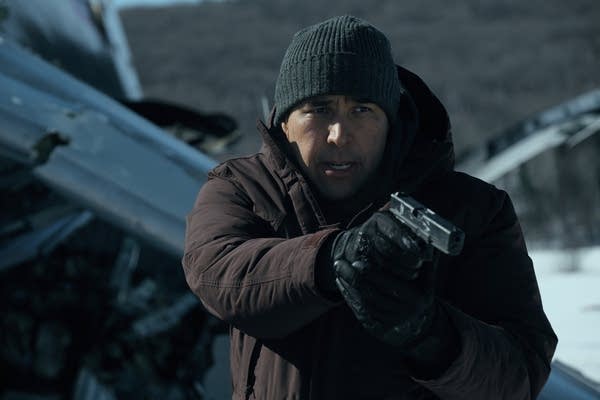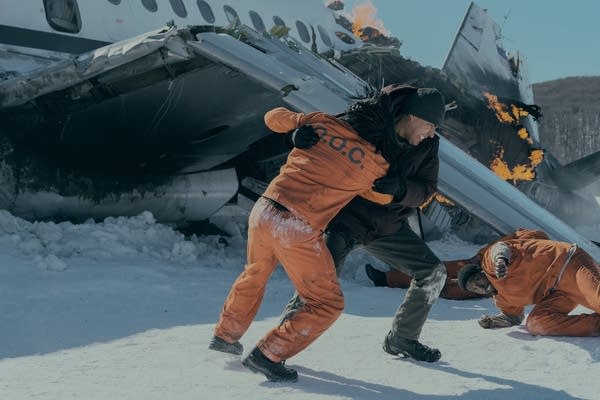A new show on Apple TV features Minnesota’s Dallas Goldtooth taking on a much more serious role than what you may have seen him in. Goldtooth is Diné and is a member of Lower Sioux Indian Community in Morton, Minn. He currently lives in Chicago.
Goldtooth’s roots are in comedy, with roles in TV shows “Reservation Dogs” and “Rutherford Falls.” His newest role is in the show “The Last Frontier,” where he plays the character Hutch, a U.S. Marshal tasked with protecting his Alaskan community in the aftermath of a prisoner transport plane crash.
Goldtooth sat down for an in-studio conversation with MPR Native News editor Leah Lemm and MPR Native News reporter Melissa Olson.
The following transcription was edited for length and clarity. Watch the video above for the full conversation.
How does the title ‘The Last Frontier’ play into the themes of the show?
“The last frontier” is actually the motto, the nickname of Alaska. I'll be very, very straightforward, as a Native person, it's a contentious title to me. It's very much from the perspective of the state, the perspective of settler colonialism, of this idea that the frontier is this edge of civilization idea. And so I always want to be mindful that for the Native peoples of that territory, it's not the edges of civilization, it's the heart of their civilization. The same goes for Minnesota — for Dakota, Ho-Chunk and Anishinaabe peoples.
But for this story, the idea of the frontier is that it's the last place to go for these convicts on the run. There's nowhere else to go. So it is a modern Western of sorts, where we're on the hunt. We play these law enforcement that track down these bad guys.

How do you embody the character Hutch? How did you build the role?
I felt so nervous. Because folks that may know me, before I got into acting, I was an organizer. I worked with a climate justice organization based out of Bemidji called the Indigenous Environmental Network. Shout out to our folks in the 218, up north. In that world of activism and organizing there's a certain perception of law enforcement. And here I am, I'm playing federal law enforcement. Not only that, I'm playing a federal law enforcement officer in the world right now, where the federal law enforcement is doing some crazy stuff. And so I think that I could not separate myself from that to a certain degree, but also acknowledge that here's an opportunity to highlight and show and represent Alaska Natives.
When I got this role, the first people I called were my folks I knew up in Fairbanks. And one of the brothers I called, his name is Sam Alexander, he was the cultural consultant for this show. And I wanted to make sure I did right by the community, because I'm not Dene, I'm not Gwich'in, I'm Dakota. A lot of people who don't know, that don't recognize that diversity within Indian Country. So it is a task to play a different tribe than your own. So I just wanted to make sure I did I did it right, and I put in a lot of time and research into it.
The other part of the research for the job is actually talk to Native U.S. Marshals. And a lot of them actually came from tribal law enforcement. So there are tribal cops, tribal police officers who went to the federal level. And so that was really, really informative. I really, really appreciated that.
How has comedy prepared you to take on a more dramatic role?
If you've seen me in my previous roles, I've been, for the most part, topless. And so I think that it has made me very comfortable to be on camera as I am. And I'm happy to say in this show I am fully clothed for most of this.
I think that comedy as an art form requires you to access such a wide breadth of your human response to the world. Like this wide breadth of emotions that come up, whether it's sadness or tragedy, hardship or joy, it's all wrapped up in comedy. I think it's allowed me to be more fluid, to be more, you know, just go with the flow, with all these different scenes that I'm in.
Did you do your own stunts in the show?
The first thing they asked is, ‘How comfortable do you feel about doing stunts?’ And I was like, ‘Dude, I want to do it all. I'm down. I'm game for it all. This is a new genre for me, so don't hold back.’
So in the first episode is a one-take scene, everything is one long scene. And it's an action sequence in which we had to do a lot of choreography. We spent a whole week doing choreography rehearsals for that, and that was pretty intense, pretty cool to be a part of.

What did you think when you first read the script for the show?
I was so excited just to be in an action role. When I started my acting career — which wasn't too long ago — I really wanted to pursue a career where I could go as far as I could without booking like one of those serious-Indians-on-a-horseback roles.
I think that as a comedian, as an artist, but also as an organizer, I think that there's inherent power in showing Native people in a contemporary setting, just as regular people in regular jobs. And I feel like this, this show contributes to that. There's some other Native actors, actresses in this show that you know are just people in the show, and I think that's really, really powerful to see.
We’re curious, what’s next for you?
I'm curious too. I think that folks don't know about the acting world, I guess the film industry, it's very much a gig economy. You got a job, and you're waiting to work on the next job, and you got to hustle for that. And the business has been taking a hit over the past few years. And so a lot less shows are being made. The seasons are a lot shorter. I have a lot of friends and comrades in the in the film industry who are also suffering, struggling, trying to find the next job. And I've been very fortunate to have landed “The Last Frontier.” We haven't had any word on season two. We're hoping, and we’ll see how it goes.



0 Comments